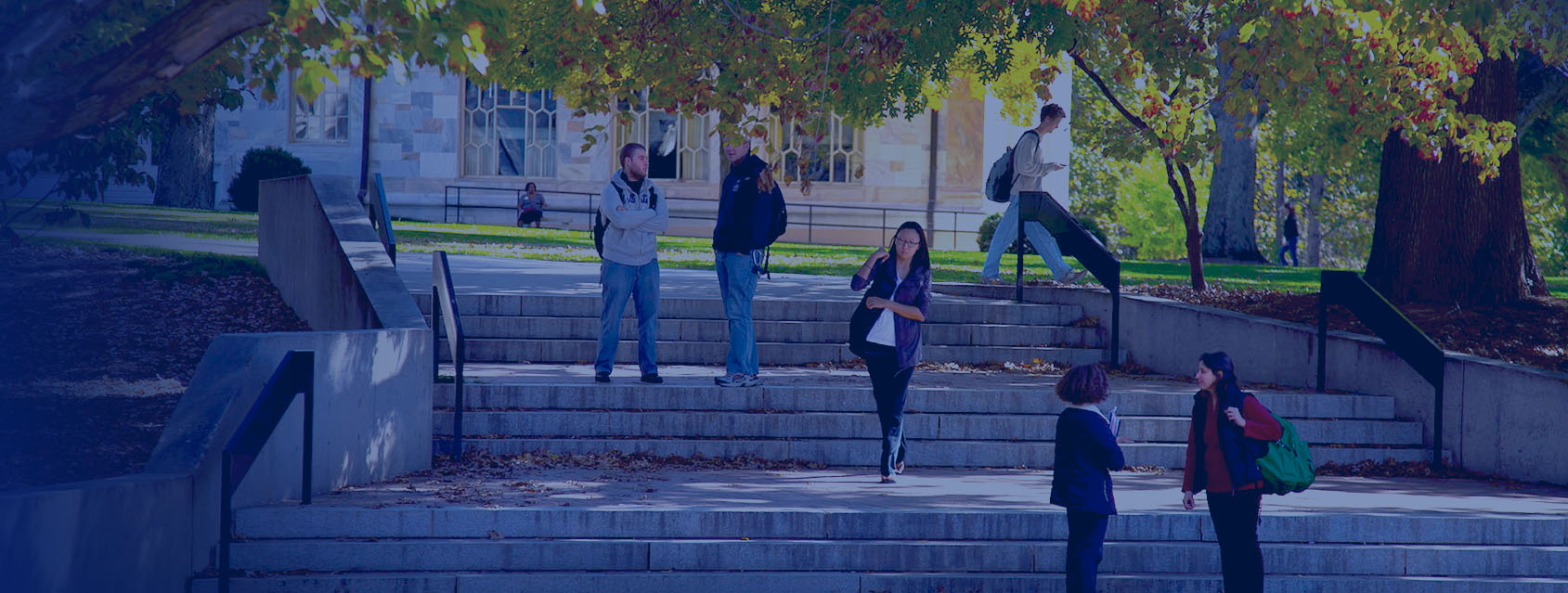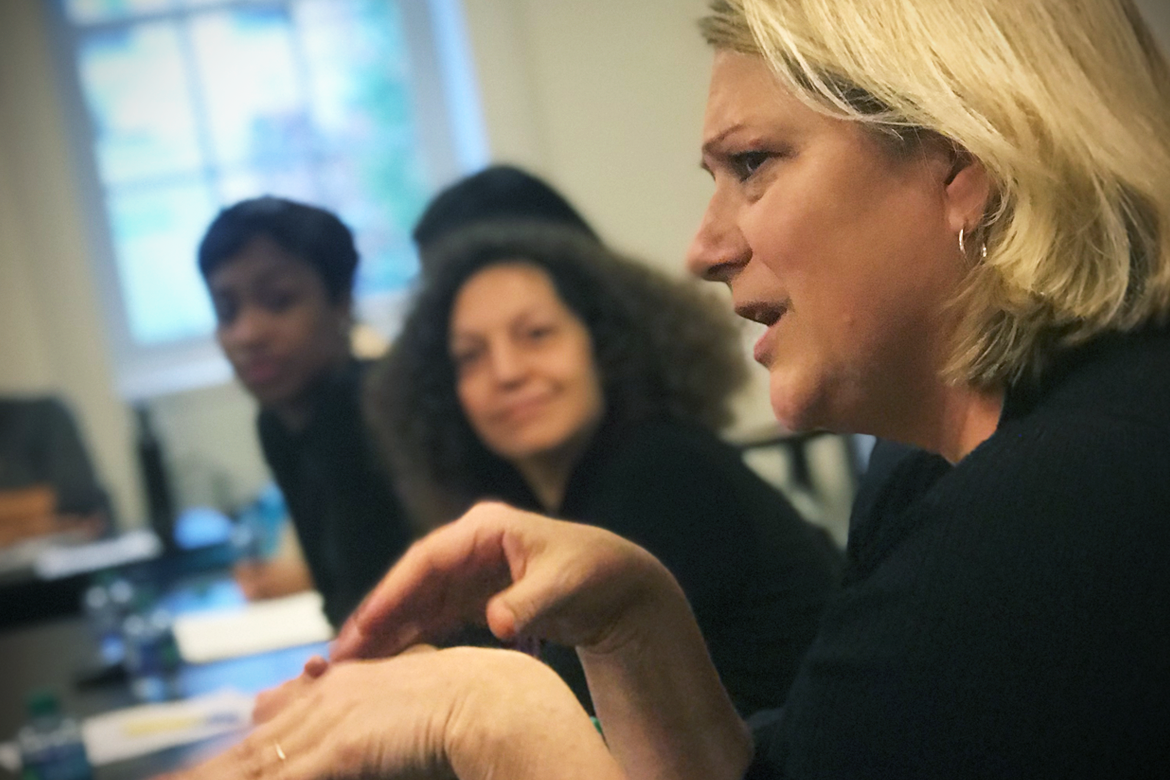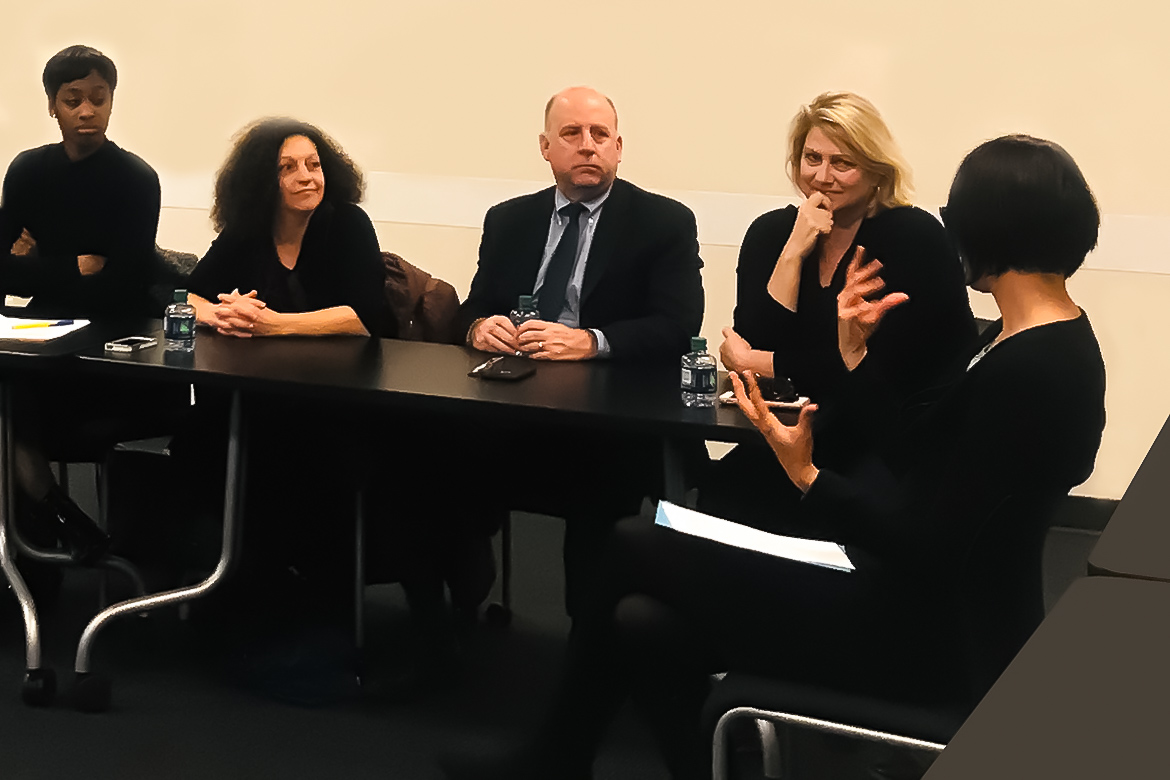
December 18, 2018
By John Baker Brown, Campus Life
Sometimes, being the first person to hold a newly created position means building from the ground up. Not so for Dona Yarbrough, who was appointed assistant vice president of Campus Life in November.
One of her responsibilities – a charge linked to the university’s One Emory Strategic Framework – is helping to break down organizational silos by leading initiatives that increase Campus Life’s engagement with academic affairs, especially partnerships with faculty.
Yarbrough is confident that she has a solid foundation on which to build – one that she and colleagues in Campus Life and Academic Affairs were laying long before her recent appointment.
 Welkley makes a point as Duncan (left) and Ristaino listen. Photo by Tina Chang.
Welkley makes a point as Duncan (left) and Ristaino listen. Photo by Tina Chang.
In November, Yarbrough collaborated with several of those colleagues to host a panel for Campus Life staff to discuss partnerships between Campus life and Academic Affairs. The goal was to offer insights for Campus Life staff that will lead to additional faculty engagement initiatives.
The three featured projects – culled from a number of ongoing faculty engagement initiatives – included Campus Life partnerships with the Emory College of Arts and Sciences.
Christine Ristaino, senior lecturer in French and Italian Studies, partners with Campus Life’s Jamechya Duncan, respect educator and survivor resource specialist with the Respect Program. They serve as co-advisors to the Emory Survivor Anthology. The anthology is an annual journal for survivors of relationship, domestic, or sexual abuse. It enables survivors to express themselves in their art, such as poetry and photography, which is published in the online journal.
“Students first produced the Survivor Anthology in the spring of 2017,” said Ristaino. “It has been a very empowering experience for survivors whose work was published – and the learning curve for me has been significant.”
According to Duncan, “Our role as advisors is to sometimes move the needle a little – to ask questions like ‘how are you informing the community through your platform of healing through the use of art.’ This works well because Emory students tend to be experiential learners, who – I am confident – will help to transform the world and become change agents in the anti-violence movement.”
Another Campus Life partnership with Emory College faculty unites undergraduates with the division’s Dining staff for actual cooking lessons. Jill Welkley, associate professor in the Center for the Study of Human Health, teaches Textbook to Table with Teresa Douglas, an instructor in the School of Medicine. The three-credit-hour elective for human health students empowers learners to connect research, lectures, and discussion in the classroom with what Welkley calls “implementation science,” or practical experience – in this case, real-life food preparation.
“The course is concerned with what the evidence tells us and how we can routinely and efficiently practice what we’ve learned,” said Welkley. “Our students critically evaluate the issues in the science of health and how they are related to our everyday dietary choices.”
 Faculty-staff partnership panelists, from left: Duncan, Ristaino, Furhman, and Welkley with moderator Yarbrough. Photo by Tina Chang.
Faculty-staff partnership panelists, from left: Duncan, Ristaino, Furhman, and Welkley with moderator Yarbrough. Photo by Tina Chang.
That’s where the four cooking sessions come in, Welkley explained. Mentored by Dining staff, students learn the appropriate techniques for cooking with certain herbs, proteins, and grains. Ultimately, students consider the nutritional value of the foods to develop their own menu and share the meal with a guest.
“This final cooking session helps prepare our students to share their knowledge with their social networks,” said Welkley. “Whether our students enter a healthcare field, which many do, or another profession, they can serve as informed and effective ambassadors for better dietary choices and better human health.”
The Textbook to Table pilot launched in fall 2016, following various collaborations between Dining and the Center for the Study of Human Health that date back to 2010. Dave Furhman, then the director of Dining, and Chad Sunstein, then assistant director of Dining, worked closely with Welkley on the project. Today, as senior director of finance, administration, and operations for Campus Life, he remains involved.
“Since we began working with the Textbook to Table course, I have found that sharing information and skills with students is hugely rewarding,” said Furhman, who partnered with faculty in the School of Medicine to establish a similar course for medical students this semester. This additional course was based on groundwork established by Textbook to Table.
The third partnership represented on the panel was the Faculty in Residence (FIR) Program. In this initiative, faculty members reside in residence halls alongside students They live and learn together and get to know one another outside the classroom.
“Many of the conversations that faculty have with students are not about academics but about life skills,” said Courtnay Oddman, assistant director of Residence Life, who partners with five faculty members in the FIR Program.
One of them is Dilek Huseyinzadegan, assistant professor of philosophy, who said that many faculty members do not know much about the range of essential services that Campus Life delivers to students.
Similarly, Yarbrough pointed out, many Campus Life staff do not understand much about the faculty role beyond classroom teaching. So, both benefit greatly from engagement initiatives.
Perhaps, Huseyinzadegan best captured the overarching goal of developing closer partnerships between Academic Affairs and Campus Life.
“The best thing about faculty engagement for me is gaining greater insight into the lives of students,” she said. “That makes me a better teacher and a better mentor for our students in the classroom and beyond it.”
Learn more:
Emory Center for the Study of Human Health
http://humanhealth.emory.edu/
Emory Survivor Anthology Volume I
https://issuu.com/survivoranthology/docs/survivor_anthology_proof
Emory Survivor Anthology Volume II
https://issuu.com/survivoranthology/docs/tsa2018digital__4_
Respect Program
http://healthpromotion.emory.edu/respect/index.html
Faculty-in-Residence (FIR) Program
https://housing.emory.edu/reslife/communities/faculty_in_residence.html
P.E.A.C.E. (Political, Ethical, Academic Community Experience) Living Learning Community at Clairmont Campus
https://housing.emory.edu/loc/theme/peace.html